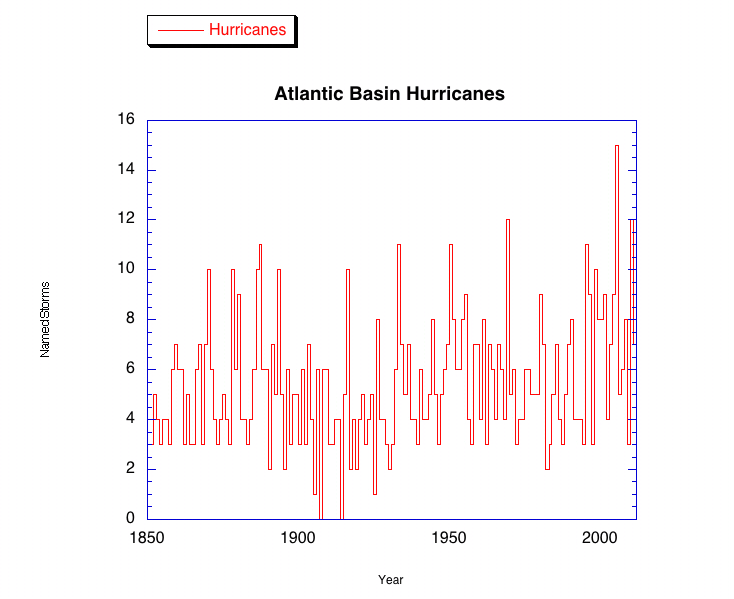You need to look at the table titled "Atlantic basin Individual years with the numbers in each category" and observe that it indicates that, on average, there are about 6 Atlantic hurricanes per year and then look at the quantity of hurricanes that happened between 2000 and 2015. There was no dearth of hurricanes in those years. Five of those years had fewer than six 'canes and all the rest of the years had six or more. The data isn't artificial. It's right there in black and white.In a period of severe HURRICANE DROUGHT -- like the 15 years from 2000 to 2015
???
You need to read the notes that go along with this data..
Take out 2005, or start the decade from 2006 and the comments stand. There's a lot of "artificiality" in this accumulation. Including ---
& Landsea et al. (2010) documented a rather large increase in short-lived tropical storms and hurricanes in the last decade, which is likely due to improved monitoring capabilities, that may be influencing the climatological average number of TCs in the Atlantic basin. With the artificial jump in the 2000s in the frequency of short-lived systems, a more realistic estimate of the long-term climatology may be closer to 13 tropical storms and hurricanes per year.
No Major Hurricane Has Made Landfall In the U.S. In More Than 9 Years -- and That's a New Record
The U.S. is in new record territory, as the nation passes the nine and a half year mark without the landfall of a major hurricane. But what researchers believe is behind the so-called hurricane drought might surprise you.
A hurricane is considered a "major hurricane" when it reaches at least Category 3 status, with maximum sustained winds of 111 mph or greater on the Saffir-Simpson Hurricane Wind Scale. Hurricane Wilma was the last major hurricane to make landfall in the U.S., when it came ashore on October 24, 2005 near Cape Romano in southwestern Florida as a Category 3 storm; Wilma actually peaked as a Category 5 as it spun in the Caribbean Sea.
This is now the longest streak since hurricane records began in 1851. The previous record was a little over nine years, set from August 11, 1860 to September 8, 1869.
If you toss out 2005 --- It's even LONGER. MEANWHILE -- more active storm chasing and tracking is BOOSTING the # of hurricanes and "major" hurricanes in the period of 2000 forward.
From your chart --- there is a "gadget" that plots out the record for the period of your table 1900 to 2016. If you look at "Hurricanes" and chuck out 2015 -- there's not a lot of evidence that ANY increase is in play.

For reference -- we've only had satellite coverage from 1968 or so.. Any implications drawn from BEFORE that period -- are NOT on solid ground..
Land-falling "droughts" COULD be a fluke. OR the total number of 'canes that tip thru 75mph for a couple hours is just increasing because of tighter monitoring.

